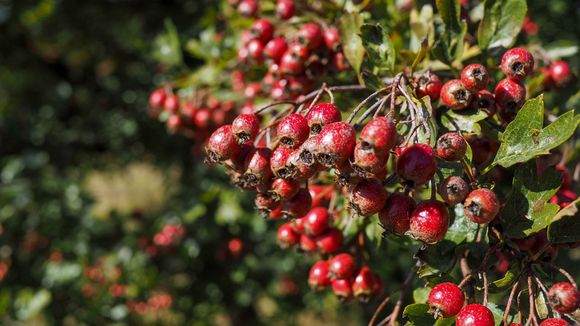1. Chest Discomfort
One of the most commonly recognized symptoms of heart disease is chest discomfort, which may include pain, tightness, or pressure in the chest. A plant known for its potential cardio-protective effects is Hawthorn (Crataegus monogyna). Hawthorn berries have been used for centuries in traditional medicine and are rich in antioxidants. Here's a simple tea recipe:
Ingredients:
- 2 teaspoons of dried hawthorn berries
- 1 cup of water
Preparation:
- Boil the water and pour it over the dried berries.
- Let it steep for about 15 minutes, strain and drink twice daily.

Photo by Griffin Quinn on Unsplash
2. Shortness of Breath
Shortness of breath, especially when performing routine activities, can be a red flag for heart disease. Motherwort (Leonurus cardiaca) has long been used to support heart and lung health.
Ingredients:
- 1 teaspoon of dried motherwort
- 1 cup of boiling water
Preparation:
- Pour boiling water over the motherwort and let steep for 10 minutes.
- Strain and drink up to three times per day.
3. Dizziness or Fainting
Dizziness or fainting can be due to a decrease in blood supply to the brain, often from a heart-related issue. Garlic (Allium sativum) has been used historically to promote heart health and can potentially help to regulate blood pressure.
4. Fatigue
Unexplained fatigue, especially in women, may be a sign of heart disease. It could be that the heart isn't pumping blood efficiently. Omega-3 fatty acids, found in flaxseeds (Linum usitatissimum), can help support heart health.
5. Rapid or Irregular Heartbeat
An unusually rapid or irregular heartbeat, especially when accompanied by weakness or shortness of breath, may indicate a heart problem. Hawthorn can also be beneficial in this situation.

Photo by Julia Topp on Unsplash
6. Persistent Cough
A persistent cough that produces a white or pink mucus could be a sign of heart failure. While this symptom warrants medical attention, the use of Ginger (Zingiber officinale) may help to support overall cardiovascular health.
7. Swelling in Feet, Legs, or Abdomen
Swelling in these areas, known as edema, can result from heart failure. Dandelion (Taraxacum officinale), a natural diuretic, may be beneficial.
8. Nausea or Lack of Appetite
Some people with heart disease may experience nausea or a lack of appetite. The bioactive compounds in Garlic can help improve general wellbeing.
9. Difficulty Concentrating or Decreased Alertness
If the brain isn't receiving enough oxygenated blood, difficulty concentrating or decreased alertness may ensue. Gingko Biloba is an herb known to enhance cerebral blood flow.
10. High Blood Pressure
While not a disease in itself, high blood pressure is a significant risk factor for heart disease. Celery (Apium graveolens) is a traditional remedy used to combat hypertension.

Photo by Çağlar Oskay on Unsplash
Herbs with Anticancer Properties
Among the plants mentioned, Garlic (Allium sativum) has been studied for its potential anticancer properties. Some research suggests that it may help to lower the risk of certain types of cancer, thanks to its sulfur compounds.
Questions and Answers
Q: Can I combine these herbs for a more potent effect?
A: While some herbs can be combined, it's essential to speak with a healthcare professional before starting any new herbal regimen, as certain herbs can interact negatively with each other or with prescription medications.
Q: Can I use these herbs if I am already on heart medication?
A: If you're already on heart medication, it's crucial to consult your doctor before incorporating these herbs into your diet, as they could potentially interfere with your medication.
Q: Can these herbs cure heart disease?
A: No, while these herbs can support heart health and help manage symptoms, they cannot cure heart disease. Always consult a healthcare professional for a comprehensive treatment plan.
Q: Can I use fresh herbs instead of dried?
A: Yes, fresh herbs can be used in most recipes, though the quantities may differ. However, certain herbs are more potent when dried, so research or consult an expert for specific herbs.
Q: What are the side effects of these herbs?
A: Like all substances, herbs can have side effects. For example, too much Garlic can cause digestive discomfort, and Hawthorn can lead to dizziness or headaches.
References
- Effects of Hawthorn (Crataegus) on the cardiovascular system
- Cardiovascular effects of motherwort (Leonurus cardiaca) herbal tincture
- Garlic supplementation and serum cholesterol: a meta-analysis
- Alpha-linolenic acid and risk of cardiovascular disease
- Anti-Oxidative and Anti-Inflammatory Effects of Ginger in Health and Physical Activity
- Taraxacum officinale as a diuretic agent and its effects on blood electrolytes
- Ginkgo biloba extract in vascular protection
- The Effect of Celery (Apium graveolens L.) on Fertility: A Systematic Review
- Garlic and cancer: A critical review of the epidemiologic literature









